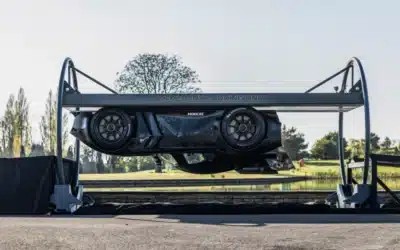
The majority of UAE drivers are planning to make electric vehicles (EVs) their primary mode of transport by 2025, according to a landmark survey into the EV landscape carried out by YouGov and commissioned by Al-Futtaim Automotive. The survey of 2,008 residents reveals a significant pivot towards e-mobility, aligning with global sustainability goals and the UAE’s ambitious Net Zero 2050 strategy.
More than a quarter (26%) of those surveyed, who currently do not own an EV, expressed interest in purchasing one in the next 12 months, while half said they would consider shifting to an EV in the same period. Some 63% say an EV will be their main way of travelling within 18 months.
While EV range continues to be a key consideration, 65% or people said they would switch to an EV with a 600km range.
These findings signal a rapid rise in willingness to go electric, with the environmental impact of traditional internal combustion engine vehicles being a significant concern, cited by 64% of respondents.

There is a rapid rise in willingness to go electric among UAE drivers.
A surge in interest
Some 28% of those asked foresee that, by 2030, between 30% and 50% of the UAE’s populace will be driving EVs or hybrid vehicles. And 73% believe that the UAE will have a comprehensive network of charging stations, located every few kilometers, across the country by 2028.
Katib Belkhodja, Customer Centricity Director, Al-Futtaim Automotive, commented on the survey: “Firstly, the results surpassed all our expectations. With 63% of respondents unequivocally choosing to make electric vehicles their primary mode of transportation, the results are not only overwhelmingly positive but also comprehensively reflect the evolving perceptions of the UAE customers towards electric mobility. It was very important for us at Al-Futtaim Automotive to conduct this survey, and get an accurate understanding of the customer mindset, especially against the backdrop of COP28.”
Removing concerns
There are some lingering concerns, however, that could hamper EV adoption. 49% of respondents cite safety as a primary hurdle. This is, however, based on a lack of understanding and familiarity. EVs are generally considered to be safer than fuel-powered cars; they tend to be less likely to overturn in a crash and less likely to catch fire. They are also modern vehicles with state-of-the-art safety features and crash prevention technology.
Around two-thirds of those surveyed (68%) perceive EVs as more expensive than traditional fuel cars, potentially hindering the transition. While the purchase price of EVs is still higher, running costs are lower and the cost is set to equal out in the next three years.
The inability to install home charging stations is a concern for 44% of residents, emphasizing the need for more public charging options. This is a particular issue in apartment buildings, where it isn’t always possible to install a home charger.
However, among those people for whom an EV isn’t a viable choice, some 74% say they would consider getting a hybrid car, which is still less polluting than a legacy combustion engine vehicle.

Many taxis in Dubai are hybrids. The recent COP28 has also inspired an increase in fully-electric public transport.
Katib Belkhodja added: “While there are still some barriers to overcome, the results have strengthened our belief in the e-mobility strategies we are currently pursuing. Our commitment to develop the electric mobility ecosystem – covering a wide EV portfolio, our own charging station (Charge2Moov) as well as e-mobility training for aftersales – directly answers most of the concerns obstructing widespread electric adoption. We are the only automotive group in the region committed to delivering this integrated, end-to-end EV offering, and through this, we are confident that we will be able to accelerate the green transition as well as fulfill our pledge to deliver 50% New Energy Vehicles and install 10% of the country’s charging stations by 2030. Our main objective now is to democratize the EV landscape by offering a wide choice of electric mobility products at diverse price and performance capabilities, and this specifically addresses a key price perception that majority of the customers have with regards to costs of EVs vs. conventional fuel cars.”
Al-Futtaim Automotive has been pioneering green mobility in the UAE since 2008, initially introducing hybrid vehicles with Toyota. Since then, it has expanded its eco-friendly footprint to offer an array of new energy vehicles from prominent brands such as Polestar, Volvo Cars, BYD, Lexus, and Volvo Group.
The willingness of drivers to shift to EVs and the overall pace of electrification in the UAE seems to be accelerating even faster than expected. Even 12 months ago, the positive sentiment – and rate of switching – among UAE drivers today wasn’t anticipated. This must be good news, not only for the automotive industry that is wanting to sell new cars, but also in terms of future climate impact.











